Do you ever find yourself rolling your eyes and letting out an exasperated sigh when your phone starts ringing or buzzing? Do you feel dread at the mere thought of having to make or receive a phone call and try to find out how to avoid talking on the phone? If you’ve ever said these words to yourself, “Why do I hate talking on the phone?” with frustration, you’re not alone.
There are many people out there who feel the same as you, and hate talking on the phone. And it turns out, there’s a very valid reason behind feeling this way, and that’s phone anxiety.
Today, we are going to talk about phone anxiety and the signs you hate talking on the phone, so that the frequency of you asking “why do I hate talking on the phone” lessens. So, are you ready to know more about this? Let’s get started, then.
Related: 6 Reasons Why Introverts Absolutely Hate Talking On The Phone
“Why Do I Hate Talking On The Phone?”: 7 Signs You Dread Phone Calls
1. You are an introverted person.
This makes sense if you’re an introvert. Even if you are not the most shy person in the room, phone calls still give you anxiety. A simple phone call or the thought of having even a 5 minute conversation with someone triggers your phone anxiety.
As an introvert, you hate phone calls so much, that you try to think of ways how to avoid talking on the phone. And when you absolutely have to make a call, you tend to prepare and rehearse what you are going to say before the call.
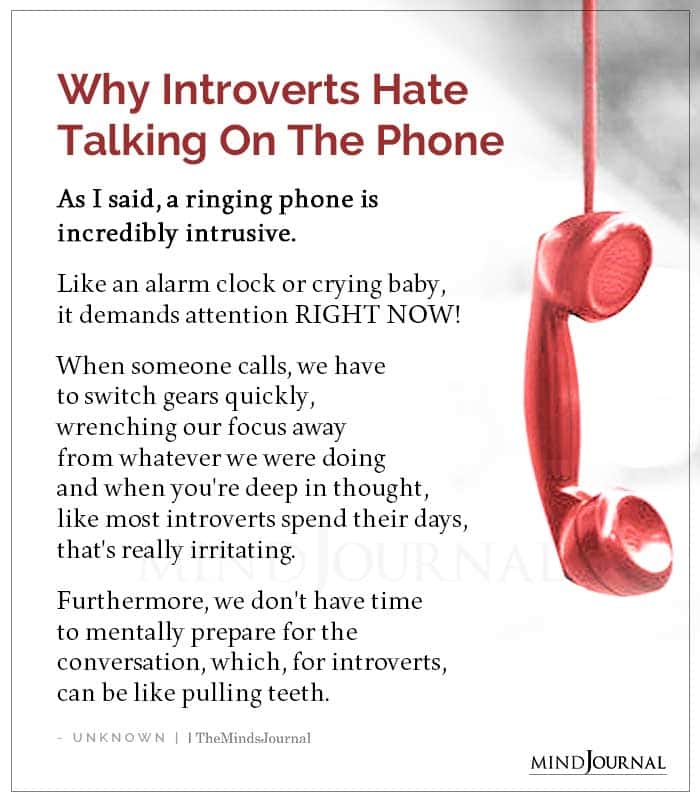
2. You don’t get any time to prepare for the conversation.
If you have ever asked yourself the question “why do I hate talking on the phone?”, then this might be a HUGE reason. A phone call can take us by surprise, and the second it rings, we don’t know who is on the other side and what they want to talk about.
Not knowing what’s going to happen always puts you in a spot, and this is why you hate talking on the phone. Not getting the time to think before you respond is scary for you. Text messages still allow you some time to think and respond, but phone calls? Not so much.
3. You feel that phone calls are very intrusive.
If you are deep in thought or working on something, a sudden phone call can really break your focus and peace. You actually need time alone to recharge and think things through. No matter who it is on the other line, it’s still going to irk you.
And let’s face it – there’s nothing more annoying than a marketing call out of the blue, especially when you’re lost in your own head or trying to figure out some tough problem. This is one of the biggest reasons behind your phone anxiety and why you hate talking on the phone.
4. You don’t get to observe facial expressions and body language.
When someone calls you, they can’t see that talking on the phone might be making you uncomfortable. Why? Because you are not being able to observe their expressions and body language to better understand how they are feeling.
Phone calls take away the chance for you to study someone’s body language, since you rely on non-verbal cues a lot, in order to gauge situations. You pay a lot of attention to the way someone stands and moves when they talk to you, and even the expressions on their face.
This makes it easier for you to talk to them and understand what you should and shouldn’t say. All in all, face-to-face conversations make you feel more at ease.
Related: Is Phone Call Anxiety Taking A Troll On Your Mental Health? 5 Signs You Shouldn’t Ignore!
5. You simply don’t want to talk to them.
Now, you may not hate and dread phone calls all the time, but the person on the other side of the call also matters, right? You feel happy to pick up some people’s calls, whereas you ignore some.
If you constantly ask yourself, “why do I hate talking on the phone?”, then this might be a major reason behind your phone anxiety. You simply don’t like talking to certain people, but maybe you had to, due to certain reasons like personal and professional obligations.
If you typically stick to a tight-knit group of people when it comes to talking on the phone, then calls from outside that circle can set off your internal alarm.
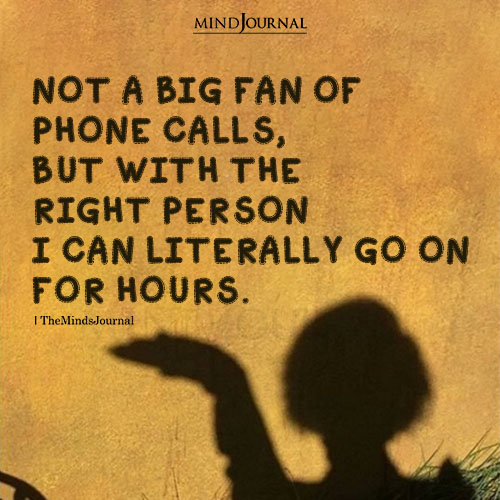
6. You are an impatient person.
One of the biggest reasons you hate talking on the phone might be your impatience. Maybe you can’t stand pausing what you’re doing or dealing with inefficiency, and you see phone calls as a waste of time, and something that zaps your energy.
You’d choose to get things done instead of putting them off by gabbing on the phone, and that’s why most of the time you let your calls go to voicemail. Did you ever think impatience would have been one of the reasons why you think about how to avoid talking on the phone?
7. You fear that the person on the other end might put you on the spot.
If you are a shy, introverted person, you like to take your time to think and then reply, which is why you prefer emails and text messages over calls. When you’re on the phone, there’s hardly any chance for you to reflect and then respond, because you just don’t have the time.
When someone calls you, more often than not, they will expect immediate responses from you, which can make you feel pressured, and trigger your phone anxiety. If you don’t get the time to think and then reply, chances are you might end up saying the wrong thing, or you might end up saying yes to something you did not want to say yes to!
Why do I hate talking on the phone? Well, I hate talking on the phone because it takes too much of my energy in a very short time; I will always, always prefer texts over calls.
Related: 13 Ways To Quiet A Worried Mind
What about you? Are you someone who always looks for ways about how to avoid talking on the phone? Do let us know your thoughts in the comments down below!
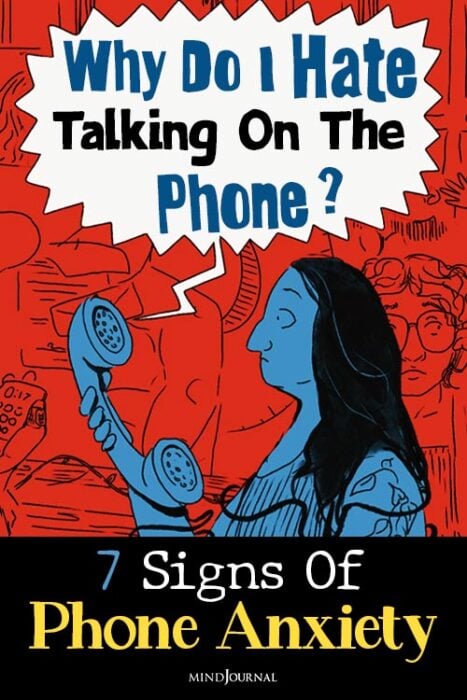
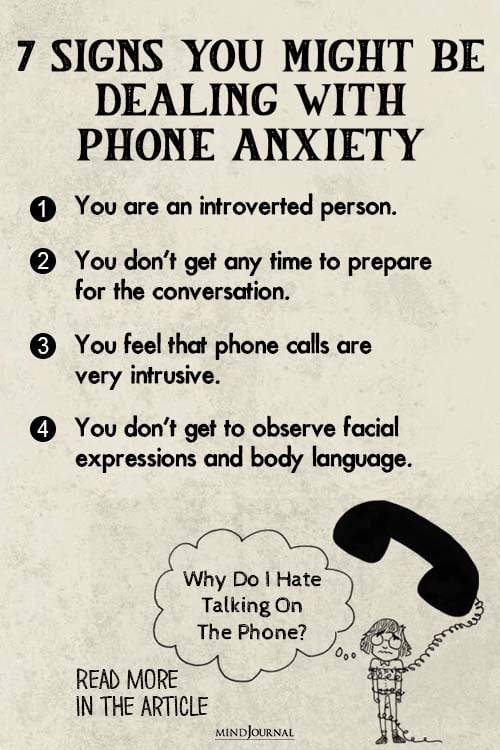

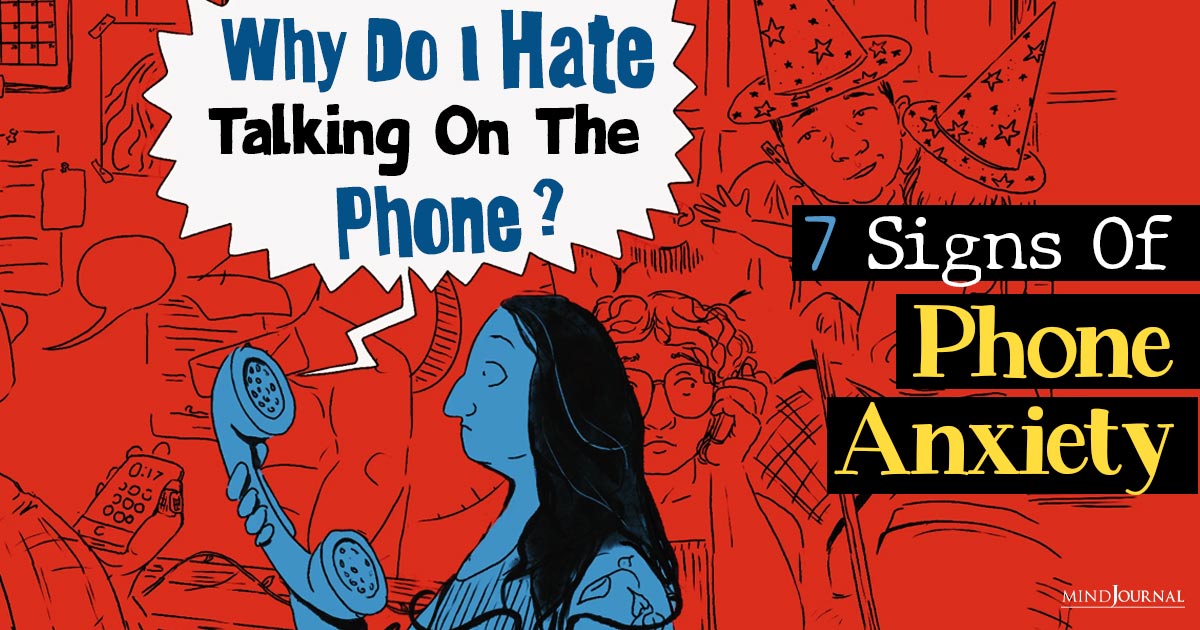







Leave a Reply